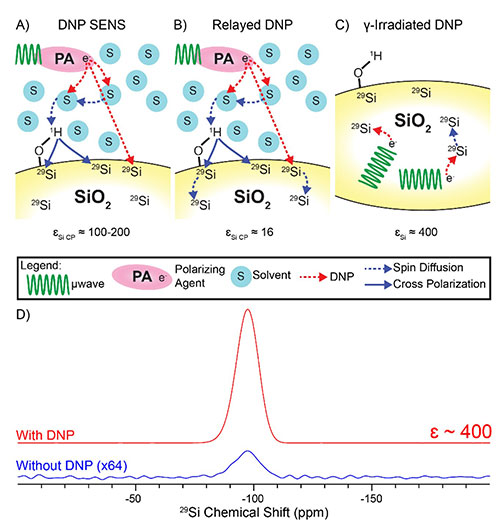- Home
-
Research Groups
Division Groups
- Artificial Photosynthesis
- Catalysis: Reactivity & Structure
- Electrochemical Energy Storage
- Electron- and Photo-Induced Processes for Molecular Energy Conversion
- Neutrino and Nuclear Chemistry
- Surface Electrochemistry and Electrocatalysis
Associated Groups
- Catalysis for Alternative Fuels Production
- Nanostructured Interfaces for Catalysis
- Structure and Dynamics of Applied Nanomaterials
- People
- Operations
- News
- Events

Electron- and Photo-Induced Processes
Dynamic Nuclear Polarization Using Radicals Created by γ-Irradiation

Different schemes for DNP on silica materials: (A) DNP Surface Enhanced NMR Spectroscopy (DNP SENS), (B) Relayed DNP and (C) γ-irradiated DNP (this work). (D) 29Si solid-state NMR spectra of amorphous quartz obtained with and without microwaves showing a DNP enhancement of ca. 400.
High-field magic angle spinning dynamic nuclear polarization (MAS DNP) is often used to enhance the sensitivity of solid-state nuclear magnetic resonance experiments by transferring spin polarization from electron spins to nuclear spins. Here, we demonstrate that γ-irradiation induces the formation of stable radicals in inorganic solids, such as fused quartz and borosilicate glasses, as well as organic solids, such as glucose, cellulose, and a urea/polyethylene polymer. The radicals were then used to polarize 29Si or 1H spins in the core of some of these materials. Significant MAS DNP enhancements (ε) of more than 400 and 30 were obtained for fused quartz and glucose, respectively. For other samples, negligible values of ε were obtained, likely due to low concentrations of radicals or the presence of abundant quadrupolar spins. These results demonstrate that ionizing radiation is a promising alternative method for generating stable radicals that are suitable for high-field MAS DNP experiments.
Phys. Chem. Lett., 2019, 10, 4770 DOI: 10.1021/acs.jpclett.9b01655




